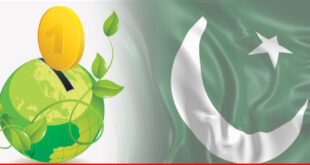‘Business and commercial activities need to be coherent with the Shariah Corridor and Islamic financial laws’
Despite tremendous growth of the Islamic banking industry it is yet to go a long way to achieve the much desired objectives of socio-economic justice by raising awareness and taking benefits of interest free financial system, free from exploitation.
Though more and more people are preferring Islamic banking but financial institutions offering these services are require to do more and significantly contribute and strengthen the efforts aimed at socio-economic development and rebuilding of the economy on sound footings.
Growing popularity of Islamic banking in the country demanded urgent measures to make it practical, beneficial and nearer to Islamic ideals of economic justice. The Islamic banking being the first step towards Interest Free Banking needed to be equally focused on social equity.
The growing numbers of Islamic banks and branches of conventional banks offering Islamic banking to the people needed to be complimented with a legal framework that may facilitate the system in its truest sense. This is definitely helping documentation of economy.
The essence of Shariah-compliant Finance is equitable distribution of resources aimed at poverty alleviation from the society. There is a need to provide long term project financing, financial inclusion of the small and medium enterprises with a focus to generate employment and economic activity at the grass root level.
According to a report, conventional banking has facilitated car financing while auto financing has positively contributed in the new as well as used car business in the country. Although Islamic banks are getting more and more clientage but it is still go a long way to replace conventional banking system. The roots of Islamic banks are linking with conventional banks.
Development potential of Pakistan
Pakistan is second largest Islamic market (population-wise) after Indonesia, and can become the most important player in Islamic banking and finance, if it attains 20 percent more market share. However, Pakistan comes after eight countries, namely Iran, Malaysia, Saudi Arabia, Bahrain, Kuwait, United Arab Emirates (UAE), Indonesia and Sudan.
According to President Pak-China Joint Chamber of Commerce and Industry, Shah Faisal Afridi, business and commercial activities need to be coherent with the Shariah Corridor and Islamic financial laws.
Referring to the Global Islamic Finance Report, Afridi said that Pakistan ranks number nine in the world in terms of development of the Islamic financial services industry in the country.
He said that time has come where we should look ahead and concentrate to develop innovative products which are more towards perfection and purity rather only towards mere permissibility by Shariah. He also stressed on the strong role of Shariah Advisors in making the Islamic banking more Shariah-compliant.
He also stated that the Islamic financial system has the potential to provide better banking and financial services than the conventional system, provided it capitalizes on its own inherent strengths and avoids following the conventional system. Afridi said that growth of Islamic banking in the country has been over 30 percent in the last few years, which is certainly above the average global growth rate of Islamic banking and finance. If this trend continues, one should expect that in the next three years Islamic banking assets will at least double from its current size of Rs926 billion. If that happens, the country will stand next to a number of Gulf countries and Malaysia where Islamic banking represents between 20 percent and 30 percent of the market share, he said, adding: “Growth in Islamic banking has been phenomenal over a period of last 7/8 years.
At present, there are more than 600 Islamic banking branches throughout Pakistan and 19 Islamic banking institutions are offering Islamic commercial banking services.
Afridi appreciated the new Islamic banking strategy by the State Bank of Pakistan to double the number of Islamic banking branches from 1,200 in the next four years, and to increase its market share from 10 to 15 percent. He highlighted that the urgent need of the Islamic Finance Industry is to build and enhance the professional capacity of each individual. He said that capacity building activities not only help to improve human and institutional capacities but also enhance communication and cooperation among concerned institutions. “To achieve the desired goal, we need highly competent, motivated and involved persons with required knowledge of conventional banking and finance as well as knowledge of Islamic Shariah.”
According to Faisal Afridi, the key drivers for growth and competitiveness of Islamic banking industry are product innovation, development and research. Flexible, practical application and enforcement of Shariah-compliant principles; creation of global financial hubs and regulators’ support for Islamic finance industry; development and adoption of simple, standard and cost effective legal frameworks for contracts associated with the new and hybrid products.
He said that Islamic banking has proved over time that it is based on firm and sound economic principles and has a good potential for become an alternative system of banking especially in view of the global financial crises. However, efforts should be made to modify the existing structure to provide better products and quality service within the ambit of Islamic laws. To develop an economic system truly reflective of the sacred principles of Islam, all stakeholders should understand the limitations at this stage and work towards its advancement, he said.
Line of attack
Financial inclusion has become an increasingly important concern for a vast number of countries worldwide. Islamic banks in Pakistan need to improve their current operating model so as to attract depositors and serve SMEs, which have so far been excluded from the formal financial sector. Furthermore, potential development of Islamic micro finance could be explored, as well as the establishment of Islamic equity funds for SMEs and the institutionalization of Islamic re-distributive mechanisms.
While improving financial infrastructure, introducing more competition in the banking system, improving the quality of credit information and enhancing the efficiency of the legal system will help promote financial inclusion, regardless of whether the banking industry contains Islamic banks.
 PAGE Blog Business Weekly Magazine
PAGE Blog Business Weekly Magazine

